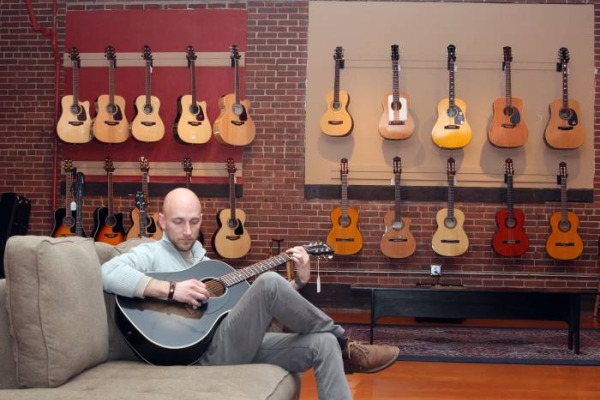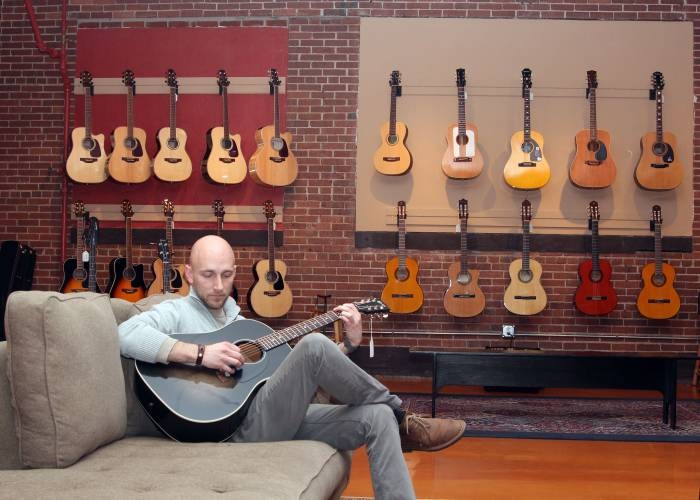
As the United States works its way back from the Great Recession and the unemployment rate grudgingly crawls back to familiar levels, a certain attitude shift has become evident among American consumers. After years of living with and accepting a market flooded with goods made at the cheapest possible rate (mostly in foreign countries with much less strict worker’s rights, if any), the tide is turning and people are seeking out well-made products.
It’s not a massive shift, but ads like Chrysler’s “Imported from Detroit” campaign or commitments to building in the U.S. from companies like Apple clearly mark a shift in the country’s collective consumer attitude. In large numbers, Americans are standing up and saying, “We do not want to buy disposable goods anymore. We want solid items, built to last, and we’re willing to pay more for them.” This isn’t a jingoistic movement, there does not appear to be a real surge of national pride associated with it; rather, it’s a common sense movement, and it so happens that it supports our neighbors in the process.
One keen observer and proponent of this trend is Ricky Bright.
At an early age, Bright developed a fascination with guitars. It started when his father handed him a guitar and he promptly took it apart. That passion raged on through his early years, but he never considered anything guitar-related as a career path until his job in film restoration was decimated by the digital photography revolution. On a whim, and without preparation, Bright went to the Music Shoppe (then located in Downtown Champaign and prominently featuring the guitar-centric Pro Sound Center) to talk with the manager about any available jobs. His innate guitar knowledge so impressed during the informal conversation that he was offered a position selling guitars and accessories.
“From all the years breaking stuff apart and rebuilding it, I had all the answers to their questions. So they hired me and I thought, ‘Oh no, what am I going to do?’” Bright joked. “I didn’t know anything about retail, but a funny thing happened: I started talking to customers and I got to know all these people, people liked me and I liked them, and I started selling things.”
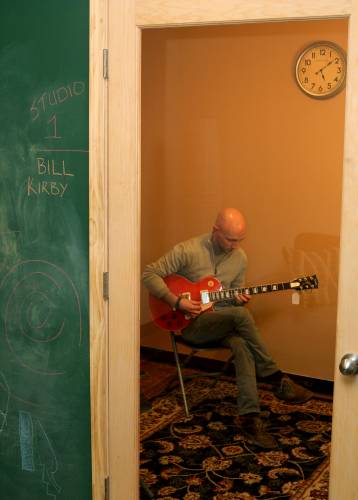
Bright worked his way through the ranks at the Music Shoppe, eventually becoming a manager himself, and followed the store to its current location on Marketview Drive where he helped develop the layout. As the store shed its stock of guitars and focused more on band instruments and sheet music, he did what he could to learn as much about this new territory, but as a guitar guy he always felt a bit out of his element. This eventually led Bright to leave the Music Shoppe, but as one door closed, another opened, and he was able to find work again managing Samuel Music in Champaign, once again being very involved in guitars and band instruments.
“I watched the ebb and flow of the industry,” he said, “and I guess the whole time I was retaining knowledge about how profit margins work and how certain stocking requirements work. All the ins and outs of running a retail space. I noticed something in common [about music stores]: for fear of the economic environment they were shrinking the quality for the quantity… and I never really agreed with that.”
When it was announced that the Champaign location of Samuel Music was closing in June, however, Bright faced the difficult question of what to do next. He and his wife considered relocating and leaving central Illinois for the sun-drenched city of Miami. But something in Bright compelled him to stay and use his knowledge of guitars and the knowledge of music retail sales he gained over several years to open his own store.
Thus, The Upper Bout was born. The store, which sells midrange and high-end musical instruments and accessories, is the culmination of Bright’s experience and passion for selling.
The most important thing Bright learned over his years in music retail is that customers looking for something inexpensive do not necessarily care about good service. If someone is the market for a beginner’s guitar, something that might fetch $150 in stores or online, they might try the instrument out in store or ask a few questions at a local retailer, but they’re just as likely to buy the item in store as they are online.
“But the guy that wants to buy the high-end guitar, he will come in and pick your brain and buy from you because you have the guitar. He doesn’t want to have a $1,000-plus guitar shipped to his house. He knows you’ve put your hands on that guitar, you set the bridge plate, you filed the nut, you filed the fret, you made sure it is worth $1,000,” said Bright.
With that in mind, Bright excluded cheap items from his store, instead stocking midrange to high-end equipment and banking on customers who value not only being able to try the instruments in store, but also The Upper Bout’s commitment to service.
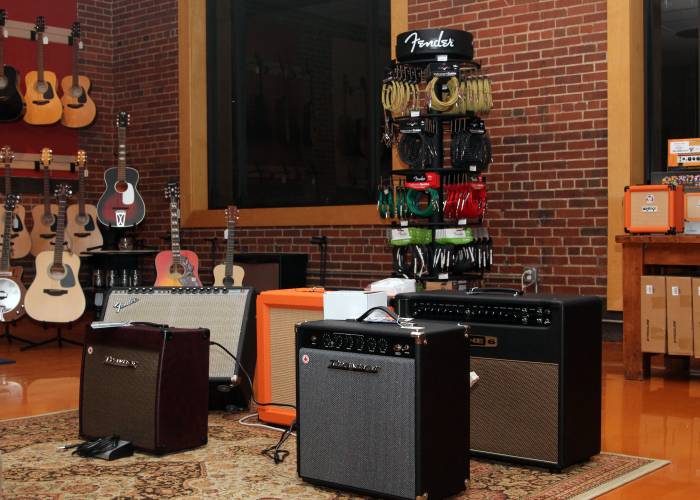
Like many post-recession Americans, Bright sees the value in American goods. First, for keeping our economy strong and, second, for their quality. As he assembled Upper Bout’s retail space at 723 S. Neil St. (in the same building as El Toro, Crossroads Corner Consignment, and The Gaming Goat), he sought out goods from local stores (only resorting to the internet for rugs) and American goods from within those stores (he only had to settle for a foreign phone and computer).
“I’m not terribly patriotic or political in any sense of the word… but I believe in American manufacturing and I would love to have nothing but American goods in here,” Bright said.
Those locally sourced goods have furnished the Upper Bout beautifully and create a space that is warm and inviting. Bright’s goal was to make a space where learning is on equal footing with purchasing; so, as you walk into the shop, the first thing you see are teaching studios with large glass doors that allow you to see learning in action.
“Working in retail spaces over the years I realized…the music lesson campaign was always an after thought,” Bright said. “I wanted to bring the concept back that, first and foremost, we are a place where we teach and get kids involved in music. Then, on the back end of that people will buy instruments because they need instruments.”
Beyond the studios, the space opens up to the retail floor. With high ceilings, guitar-lined walls and a bank of pianos, hand drums and accessories, Upper Bout feels like the kind of place where musicians could easily lose track of time. Bright’s dream is to have only American-made instruments, but financial and contractual realities have made that dream unreachable.
However, the quality of the goods is undeniable. Among the guitars, the store features Gibson (manufactured in Memphis, TN, and Bozeman, MT), Fender (starting at the American models, deliberately not carrying any foreign-made models) and Breedlove (Bend, OR) guitars as well as Jet City (Lynnwood, WA) and Fender amplifiers. Bright has even been in contact with Ben Juday of Analog Outfitters to be a local supplier for their growing company. Among, the foreign-made products in the shop are brands such as Epiphone, Orange, Takamine, Hughes and Kettner, as well as Yamaha pianos — all meeting Bright’s high expectations.
“To me quality is quality,” he said. “I’d like for it to be all American, but there are a lot of brands out there that are made somewhere else and they’re really good.”
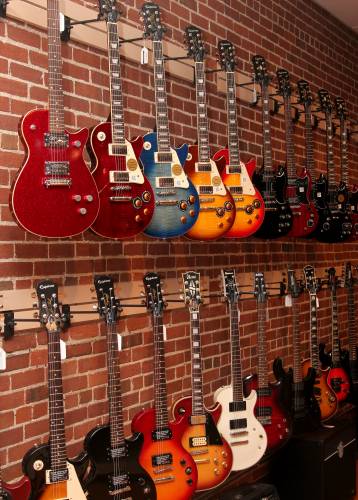
If anyone is interested in the quality of those instruments, all they have to do is ask Bright or one of his employees about them. One thing that stands out about the people at Upper Bout is their knowledge and willingness to discuss music. Spend a few minutes talking to Bright and it’s not hard to imagine the hours he has spent with every item in the store, and the same holds for those he has placed around him.
Not everyone likes to talk, though, some just prefer to shop on their own. This is something the staff at Upper Bout know, and they’re more than happy to accommodate those customers as well.
Upper Bout wants to accommodate everyone, from beginners to experts and hobbyists to professionals. For those who want to learn, Bright hopes to offer group workshops in addition to lessons. For those who like to perform, Bright envisions his space as a place for acoustic acts or school groups to come and perform — for free, of course. The goal behind this is not just to get business, however, it’s to “grow musicians” and become a part of life in C-U.
“We want to develop a solid music store in C-U that continues to give back the community. Because, first off, I think that’s the only way a store can survive, a sincere connection with the people around it; and second, I would hate to see a landscape in C-U where you have a Walmart on the north side and the south side and nothing in the center,” Bright commented.
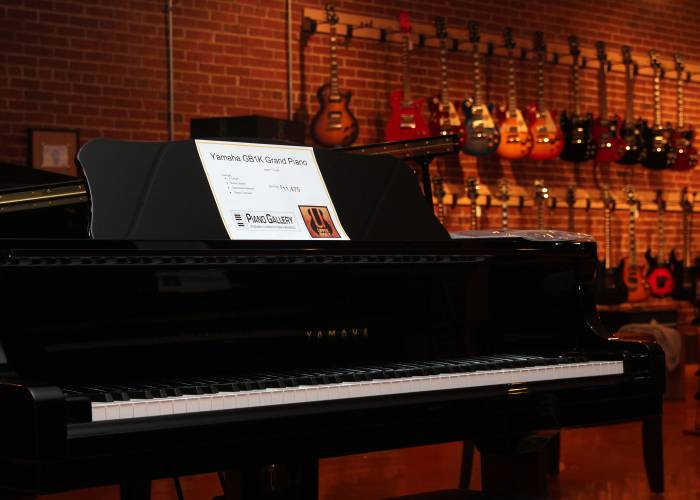
What Bright has in mind for Upper Bout is informed by his experience and only bound by his imagination, and he’s putting it together at the right time. Some might call him crazy for opening a store offering only midrange and high-end equipment, but as consumer preference shifts back toward solid, long-lasting goods, his shop may be poised to be a great success.
Upper Bout’s grand opening is Saturday, beginning at 11 a.m. Everything in the store will be 10% off and a Gibson Les Paul Melody Maker will be given away at 5 p.m.








